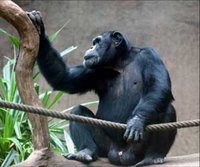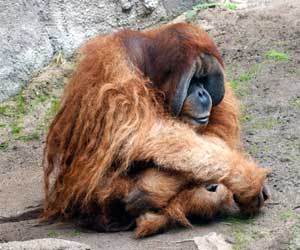It's hard out here for a chimp
Two days after I met Alex he got into a fight with Unyoro, the alpha male for the Chimp B group. The keepers found the little guy beaten up with one finger hanging off that they decided to remove. The researchers are puzzled because Alex is seldom as annoying as his sisters and not likely to challenge an older chimp at his age (5 yrs old). I saw him yesterday climbing one handed and staying out of the way of all the adults. He still carried his blanket with his foot.
Fights break out all the time among chimps for reasons not always evident to the novice observer. Juvenile males start to harrass adult females in order to assert their dominance. The alpha male eventually gets challenged by the young turks in the group. In the A group, Frodo
 periodically has attempted to assert his primacy only to be smacked down by Robert, the alpha, and Patrick, the third adult male who supports Robert. Alliances are more important than size, as described by Frans de Waal in Chimpanzee Politics.
periodically has attempted to assert his primacy only to be smacked down by Robert, the alpha, and Patrick, the third adult male who supports Robert. Alliances are more important than size, as described by Frans de Waal in Chimpanzee Politics.The alpha male occasionally beats up one of the adult females, but females harass each other too. Swela joined the A group last year and has had a tough time integrating. The other females would beat her and chase her away. Eventually, she ingratiated herself to the adult males who now protect her from the other ladies. Swela does have the strange habit of making male-like sexual solicitations toward some of the females - she stamps her feet at them. But this has not gone any further.
Aggression usually takes the form of chasing, screaming, hitting with sticks or fists while the rest of the group hoots like crazy - basically, like the World Cup matches. But it seldom leads to the kind of damage that Alex suffered. When real problems between chimps develops, the care-takers can see it building over a few days and separate the troublemakers.



